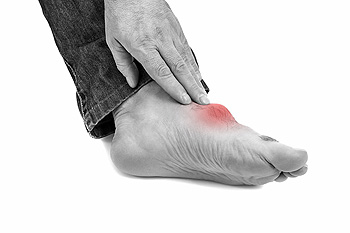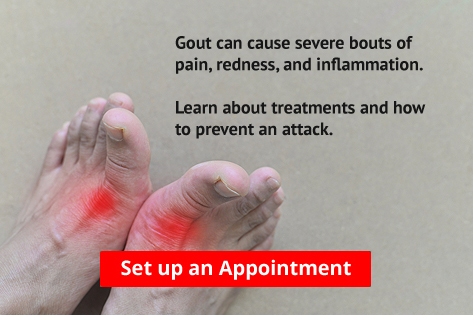Blog
Symptoms of Gout
 There are several types of arthritis, including gout. It is known to be a painful condition that generally affects the big toe. Some of the symptoms that are associated with gout can include severe pain and discomfort, redness, and the affected area may feel hot. It may occur as a result of elevated uric acid levels in the blood, and can form crystals which lodge in the joints of the big toe. Existing factors that may increase the chances of being afflicted with gout can consist of being diabetic, having high blood pressure, or being overweight. There are methods that can be taken which may prevent gout attacks. It is helpful to reduce alcohol intake, eliminate food and drinks that have high sugar levels, and avoid red meat. If you have experienced a gout attack, it is strongly recommended that you are under the care of a podiatrist.
There are several types of arthritis, including gout. It is known to be a painful condition that generally affects the big toe. Some of the symptoms that are associated with gout can include severe pain and discomfort, redness, and the affected area may feel hot. It may occur as a result of elevated uric acid levels in the blood, and can form crystals which lodge in the joints of the big toe. Existing factors that may increase the chances of being afflicted with gout can consist of being diabetic, having high blood pressure, or being overweight. There are methods that can be taken which may prevent gout attacks. It is helpful to reduce alcohol intake, eliminate food and drinks that have high sugar levels, and avoid red meat. If you have experienced a gout attack, it is strongly recommended that you are under the care of a podiatrist.
Gout is a painful condition that can be treated. If you are seeking treatment, contact Dr. Michael E. Newman from Pennsylvania. Our doctors will treat your foot and ankle needs.
What Is Gout?
Gout is a form of arthritis that is characterized by sudden, severe attacks of pain, redness, and tenderness in the joints. The condition usually affects the joint at the base of the big toe. A gout attack can occur at any random time, such as the middle of the night while you are asleep.
Symptoms
- Intense Joint Pain - Usually around the large joint of your big toe, and it most severe within the first four to twelve hours
- Lingering Discomfort - Joint discomfort may last from a few days to a few weeks
- Inflammation and Redness -Affected joints may become swollen, tender, warm and red
- Limited Range of Motion - May experience a decrease in joint mobility
Risk Factors
- Genetics - If family members have gout, you’re more likely to have it
- Medications - Diuretic medications can raise uric acid levels
- Gender/Age - Gout is more common in men until the age of 60. It is believed that estrogen protects women until that point
- Diet - Eating red meat and shellfish increases your risk
- Alcohol - Having more than two alcoholic drinks per day increases your risk
- Obesity - Obese people are at a higher risk for gout
Prior to visiting your podiatrist to receive treatment for gout, there are a few things you should do beforehand. If you have gout you should write down your symptoms--including when they started and how often you experience them, important medical information you may have, and any questions you may have. Writing down these three things will help your podiatrist in assessing your specific situation so that he or she may provide the best route of treatment for you.
If you have any questions, please feel free to contact one of our offices located in Plymouth Meeting and Ambler, PA. We offer the newest diagnostic and treatment technologies for all your foot care needs.
Read more about GoutPain in the Back of the Leg
 Patients who have experienced an Achilles tendon injury are often familiar with the pain and discomfort this condition can cause. It can often be debilitating, and may considerably restrict the ability to walk and run. This tendon is located in the calf, and it connects the calf muscles to the ankle. This type of injury can happen as a result of being overweight, exercising on uneven surfaces, or wearing shoes that do not fit correctly. Some of the symptoms that are associated with a partial or complete tear of the Achilles tendon can include swelling, severe pain in the back of the leg, and it may be difficult to move the ankle. If you think you may have an Achilles tendon injury, please schedule an appointment with a podiatrist as quickly as possible so the correct treatment can begin.
Patients who have experienced an Achilles tendon injury are often familiar with the pain and discomfort this condition can cause. It can often be debilitating, and may considerably restrict the ability to walk and run. This tendon is located in the calf, and it connects the calf muscles to the ankle. This type of injury can happen as a result of being overweight, exercising on uneven surfaces, or wearing shoes that do not fit correctly. Some of the symptoms that are associated with a partial or complete tear of the Achilles tendon can include swelling, severe pain in the back of the leg, and it may be difficult to move the ankle. If you think you may have an Achilles tendon injury, please schedule an appointment with a podiatrist as quickly as possible so the correct treatment can begin.
Achilles tendon injuries need immediate attention to avoid future complications. If you have any concerns, contact one of our podiatrists of Pennsylvania. Our doctors can provide the care you need to keep you pain-free and on your feet.
What Is the Achilles Tendon?
The Achilles tendon is a tendon that connects the lower leg muscles and calf to the heel of the foot. It is the strongest tendon in the human body and is essential for making movement possible. Because this tendon is such an integral part of the body, any injuries to it can create immense difficulties and should immediately be presented to a doctor.
What Are the Symptoms of an Achilles Tendon Injury?
There are various types of injuries that can affect the Achilles tendon. The two most common injuries are Achilles tendinitis and ruptures of the tendon.
Achilles Tendinitis Symptoms
- Inflammation
- Dull to severe pain
- Increased blood flow to the tendon
- Thickening of the tendon
Rupture Symptoms
- Extreme pain and swelling in the foot
- Total immobility
Treatment and Prevention
Achilles tendon injuries are diagnosed by a thorough physical evaluation, which can include an MRI. Treatment involves rest, physical therapy, and in some cases, surgery. However, various preventative measures can be taken to avoid these injuries, such as:
- Thorough stretching of the tendon before and after exercise
- Strengthening exercises like calf raises, squats, leg curls, leg extensions, leg raises, lunges, and leg presses
If you have any questions please feel free to contact one of our offices located in Plymouth Meeting and Ambler, PA . We offer the newest diagnostic tools and technology to treat your foot and ankle needs.


